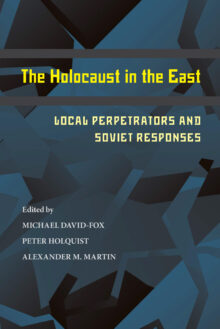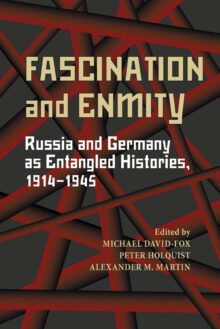
Alexander M. Martin
Alexander M. Martin is associate professor of history at the University of Notre Dame. He is the author of Romantics, Reformers, Reactionaries: Russian Conservative Thought and Politics in the Reign of Alexander I.
The Holocaust in the East
Local Perpetrators and Soviet Responses
Silence has many causes: shame, embarrassment, ignorance, a desire to protect. The silence that has surrounded the atrocities committed against the Jewish population of Eastern Europe and the Soviet Union during World War II is particularly remarkable given the scholarly and popular interest in the war. It, too, has many causes—of which antisemitism, the most striking, is only one. When, on July 10, 1941, in the wake of the German invasion of the Soviet Union, local residents enflamed by Nazi propaganda murdered the entire Jewish population of Jedwabne, Poland, the ferocity of the attack horrified their fellow Poles. The denial of Polish involvement in the massacre lasted for decades.
Since its founding, the journal Kritika: Explorations in Russian and Eurasian History has led the way in exploring the East European and Soviet experience of the Holocaust. This volume combines revised articles from the journal and previously unpublished pieces to highlight the complex interactions of prejudice, power, and publicity. It offers a probing examination of the complicity of local populations in the mass murder of Jews perpetrated in areas such as Poland, Ukraine, Bessarabia, and northern Bukovina and analyzes Soviet responses to the Holocaust.
Based on Soviet commission reports, news media, and other archives, the contributors examine the factors that led certain local residents to participate in the extermination of their Jewish neighbors; the interaction of Nazi occupation regimes with various sectors of the local population; the ambiguities of Soviet press coverage, which at times reported and at times suppressed information about persecution specifically directed at the Jews; the extraordinary Soviet efforts to document and prosecute Nazi crimes and the way in which the Soviet state’s agenda informed that effort; and the lingering effects of silence about the true impact of the Holocaust on public memory and state responses.
Fascination and Enmity
Russia and Germany as Entangled Histories, 1914–1945
Russia and Germany have had a long history of significant cultural, political, and economic exchange. Despite these beneficial interactions, stereotypes of the alien Other persisted. Germans perceived Russia as a vast frontier with unlimited potential, yet infused with an “Asianness” that explained its backwardness and despotic leadership. Russians admired German advances in science, government, and philosophy, but saw their people as lifeless and obsessed with order.
Fascination and Enmity presents an original transnational history of the two nations during the critical era of the world wars. By examining the mutual perceptions and misperceptions within each country, the contributors reveal the psyche of the Russian-German dynamic and its use as a powerful political and cultural tool.
Through accounts of fellow travelers, POWs, war correspondents, soldiers on the front, propagandists, revolutionaries, the Comintern, and wartime and postwar occupations, the contributors analyze the kinetics of the Russian-German exchange and the perceptions drawn from these encounters. The result is a highly engaging chronicle of the complex entanglements of two world powers through the great wars of the twentieth century.


